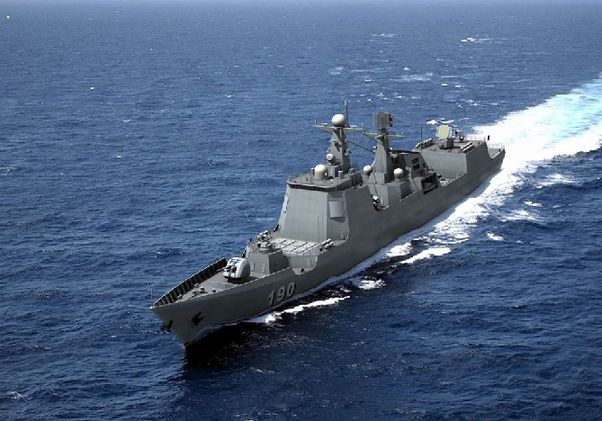Chinese warships will continue to patrol waters where Beijing has territorial claims, a top general said Sunday, amid simmering rows with neighbouring countries over the South China Sea and islands controlled by Japan.
Lieutenant General Qi Jianguo, deputy chief of the general staff of the People’s Liberation Army, defended the patrols as legitimate and said his country’s sovereignty over the areas could not be disputed.
“Why are Chinese warships patrolling in East China Sea and South China Sea? I think we are all clear about this,” Qi told the annual Shangri-La Dialogue security conference in Singapore.
“Our attitude on East China Sea and South China Sea is that they are in our Chinese sovereignty. We are very clear about that,” he said through an interpreter.
“So the Chinese warships and the patrolling activities are totally legitimate and uncontroversial.”
Qi was responding to a question from a delegate after giving a speech in which he sought to assure neighbouring countries that China has no hegemonic ambitions.
“China has never taken foreign expansion and military conquering as a state policy,” he said.
One delegate however said there appeared to be growing regional scepticism over China’s peaceful intentions because it was inconsistent with moves to send naval patrols to waters where other countries also have claims.
China is locked in a territorial dispute with Brunei, Malaysia, the Philippines and Vietnam in the South China Sea.
The four states have partial claims to islands but China says it has sovereign rights to nearly all of the sea, including areas much closer to other countries and thousands of kilometres from the Chinese coast.
China also has a dispute with Japan over the Senkaku islands, which Beijing calls the Diaoyus, in the East China Sea.
“I do hope the statements of the good general today will be translated into action,” Philippine Defense Secretary Voltaire Gazmin told reporters.
He said Qi’s remarks about China having no hegemonic ambitions were “far from what is happening” in the sea.
Manila last month protested at what it called the “provocative and illegal presence” of a Chinese warship near Second Thomas Shoal, which is occupied by Philippine troops.
Among the other moves that have caused alarm were China’s occupation of a shoal near the Philippines’ main island last year, and the deployment in March of Chinese naval ships to within 80 kilometres (50 miles) of Malaysia’s coast.
Competing claims have for decades made the area — home to rich fishing grounds and vital global shipping lanes and believed to sit atop vast natural gas deposits — one of Asia’s potential military flashpoints.
China and Vietnam fought in 1974 and 1988 for control of islands in battles that left dozens of soldiers dead.
The US-China strategic rivalry also loomed large during the conference, with US Defense Secretary Chuck Hagel on Saturday accusing Beijing of waging cyber espionage against the United States.
But General Qi on Sunday allayed concerns that China had dropped a pledge not to be the first to use nuclear weapons in a conflict.
Omission of the “no-first-use” pledge in a recent defence white paper had created ripples in military circles and sparked speculation that China may have abandoned the policy.
Qi also distanced his government from claims by some Chinese scholars that the Ryukyu Islands, which include Okinawa, do not belong to Japan.
“This is only an article of particular scholars and their views on these issues… it does not represent the views of the Chinese government,” he said.
Maritime disputes and the risks of conflicts that could hurt Asia’s economic growth were a running theme during the three-day conference that ended Sunday.
“Asia holds great promise for ourselves and the world but continued peace and prosperity in this region are neither fait accompli nor automatic,” Singapore Defence Minister Ng Eng Hen told the conference.
“Instead, if we are to continue to enjoy stability and progress, we must work effectively in unison to strengthen areas of common interests.”
The Philippines’ Gazmin defended Manila’s move unilaterally to bring its territorial dispute with China before a UN tribunal after China refused to take part.
“We hope that the arbitration tribunal will issue a clarification in accordance with international law that will direct China to respect our sovereign rights,” Gazmin told the forum.










